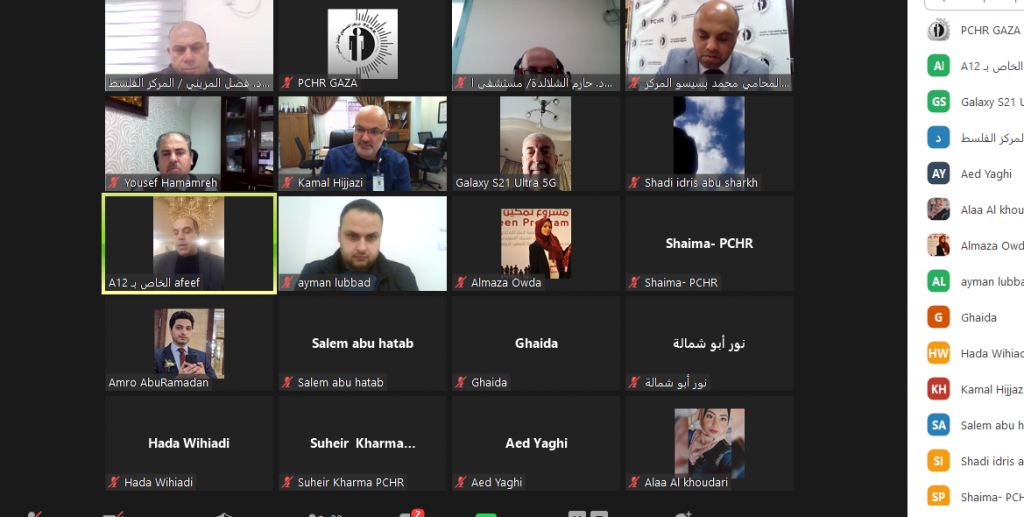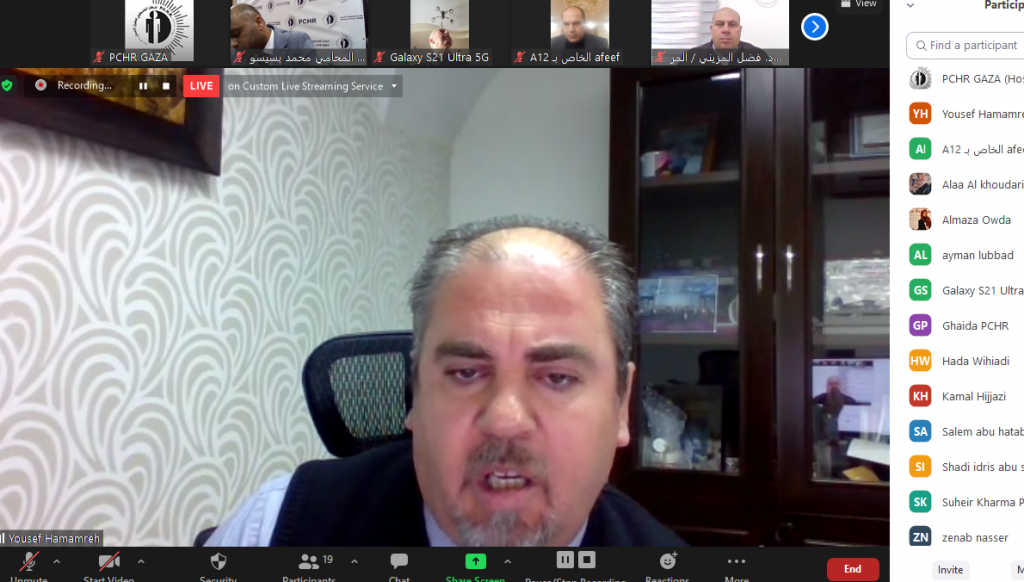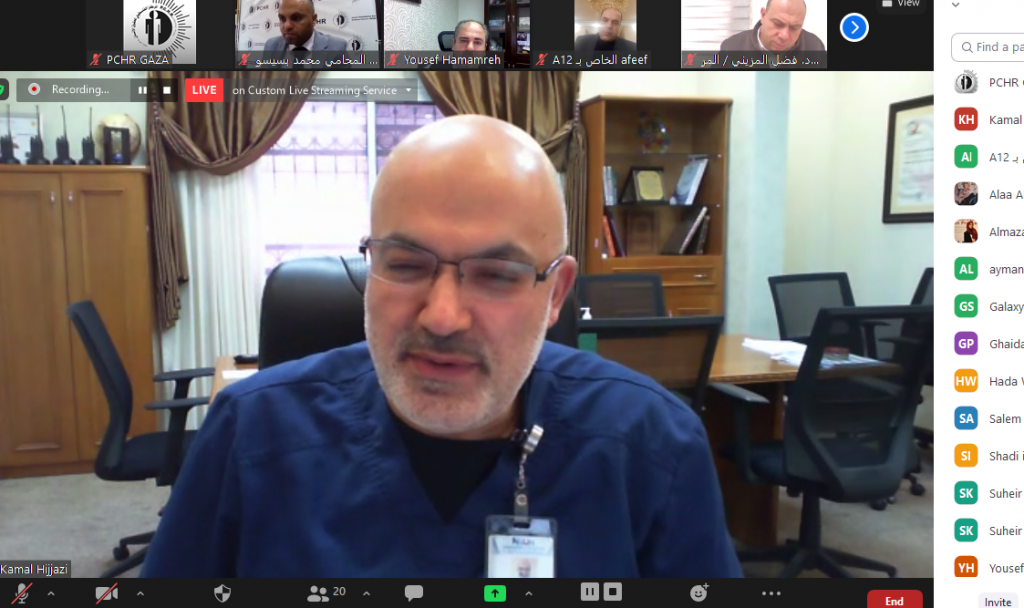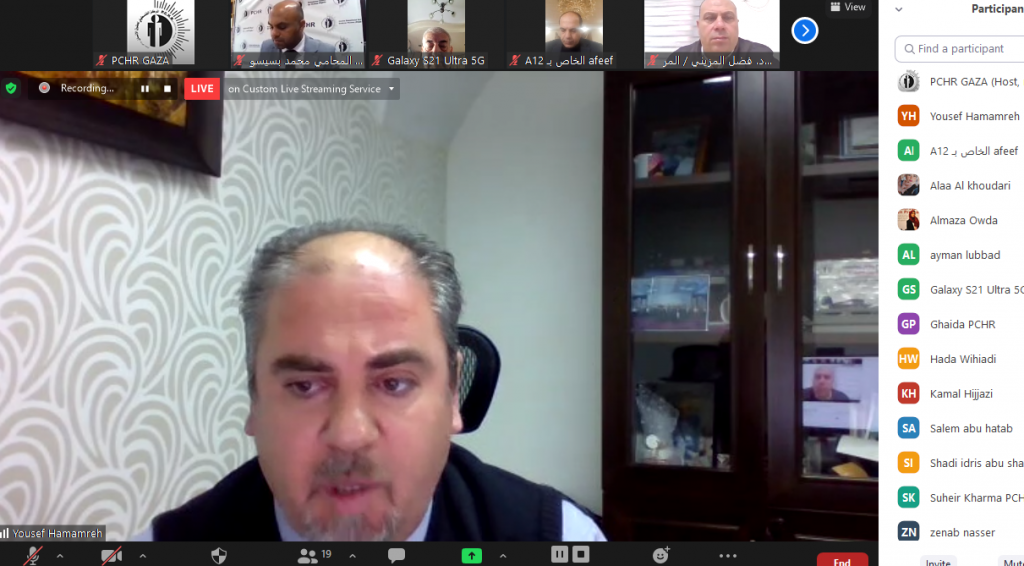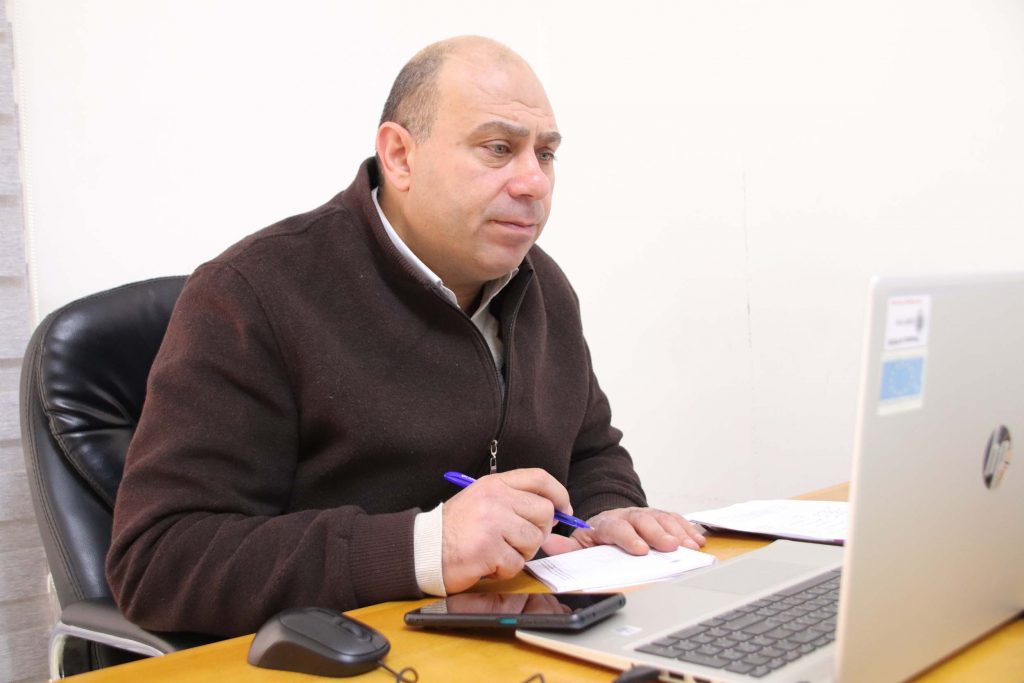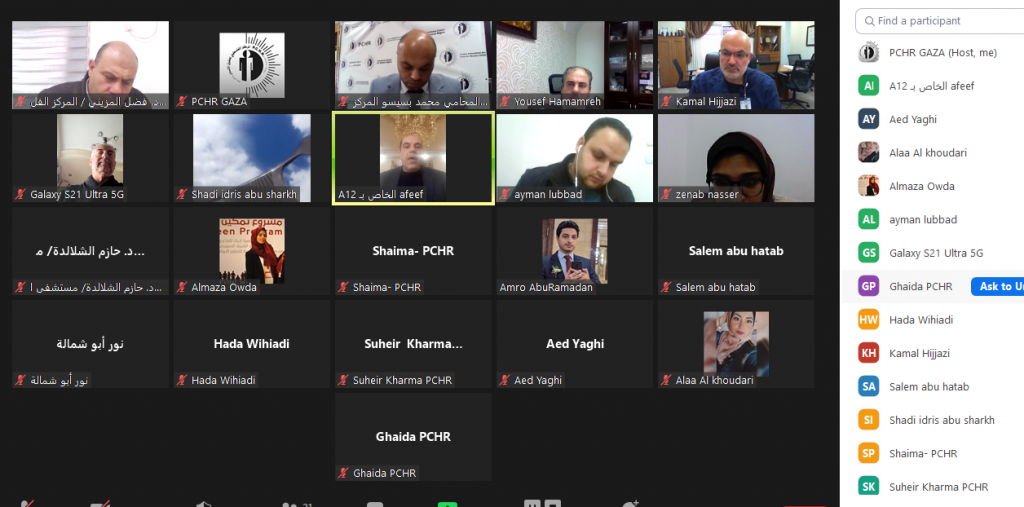
Ref: 2/2022
Date: 26 January 2022
On Wednesday, 26 January 2022, the Palestinian Centre for Human Rights (PCHR) organized a panel discussion online via Zoom, titled as “Efficacy of Patient Referral System for Treatment Abroad.” The panel discussion was attended by representatives of Service Purchase Unit (SPU) at the Ministry of Health (MOH), which mainly manages this file, hospitals providing health services, and Civil Society Organizations.
Dr. Fadel al-Muzaini, Director of PCHR’s Economic and Social Rights Unit, opened the discussion, emphasizing it aims at reviewing the patient referral system for treatment abroad and trying to overcome the challenges and obstacles on patients’ way to get the adequate medical service for serious and stubborn diseases. He added that these patients are in urgent and instant need for treatment, particularly after MOH’s investigation into the death of Salim al-Nawati that concluded all parties who dealt with al-Nawati’s file are held responsible for his death, including MOH (Treatment Abroad Department and Medical Referral System) and all public, private and NGO hospitals that refused to receive him.
Mohammed Bseiso, a lawyer at PCHR’s Legal Unit, tackled PCHR’s efforts and interventions at the service of patients through successfully coordinating with the Treatment Abroad Department the travel and treatment of 744 patients in 2021. Bseiso also reviewed all challenges facing Gaza Strip’s patients when they are referred abroad for treatment, particularly emergency patients who suffer from the bureaucratic procedures, including obtaining Treatment Form s1 for each doctor visit to continue their treatment. Bseiso called for putting the Treatment Abroad Department’s work aside from any political impact to guarantee that all patients fairly obtain their right to health and treatment.
Dr. ‘Afif al-‘Atawnah, Director of MOH’s Treatment Abroad Department, stressed that the referral system is currently under evaluation, and new work mechanisms will be developed, heading towards localization of health services based on development of medical services at governmental and non-governmental hospitals. Al-‘Atawnah added that the technical committees are striving for referring emergency patients to receive their treatment at a proper place as these committees weekly meet for this. He highlighted that the Treatment Abroad Department launched a website that allows citizens to track their medical referrals. He emphasized that there is a recommendation to refer Gaza Strip’s patients to the West Bank’s hospitals due to their inability to afford the suffering and costs of traveling to Egypt. He stressed that the Department needs more time to work on developing the treatment abroad system, underscoring that all recommendations and suggestions mentioned in the panel discussion will be taken in consideration and included in the Department’s policies.
Dr. ‘Adnan Hamamrah, Director of Cancer Center at Augusta Victoria Hospital (al-Mutala’) in occupied East Jerusalem, said that 37% of the hospital patients are from the Gaza Strip and receive cancer treatment within the medical referrals system. He emphasized that some patients were diagnosed with cancer and started their treatment after 4 months due to prolonged patient referral procedures for treatment abroad. He added that having two committees for cancer patients make them wait much longer, in addition to waiting for the coordination with the Israeli sides in order to get a travel permit. Hamamrah suggested to have only one specialized committee in the Gaza Strip to take the referral decision immediately. He also called upon MOH to supply the governmental hospitals with basic and inexpensive medicines to stop the referral of patients to spare the referral of patients only for taking low-cost medications, thereby burdening the medical referral system.
Dr. Kamal Hijazi, Director of An-Najah National University Hospital (NNUH), talked about the importance of developing a communication mechanism between doctors in the West Bank and Gaza Strip Hospitals to discuss the diagnosis of cases and the required medical intervention before their referral abroad for treatment. Hijazi stressed that we should solve the problem of dividing the treatment between the private and governmental hospitals to avoid exhaustion of patients, especially after the interruption of his treatment. He also pointed out to the need for constant coordination regarding the private hospital bed capacity so that no patient would arrive and find no place at the hospital.
Dr. Hazim Shalaldah, Director of al-Mizan Hospital in Hebron, stressed the importance of enhancing citizens’ culture to join the health insurance system in order to promote the Treatment Abroad Department’s financial capacity and enable it to plan effectively to cover the costs of patients’ treatment outside the governmental hospitals. He added that the medical referral system should be developed to provide the best medical services for emergency patients and those suffering from serious diseases.
Dr. ‘Adnan Farhoud, Director of Makassed Islamic Charitable Society Hospital, demanded the allocation of national hospitals for patients’ treatment to spare them the troubles of travel to neighboring countries. He affirmed that as part of its efforts to alleviate the suffering of Gaza Strip patients, Makassed Hospital is work on designating buses to transport patients from the Erez Crossing to the hospital.
PCHR’s lawyer Mohammed al-‘Alami suggested the need to have an electronic system for the Treatment Abroad Department to avoid the exhausting routine procedures and thereby facilitating the SPU mission.
In the recommendations, the attendees called for evaluating the current patient referral system for treatment abroad and improving it to remove all obstacles facing the patients referred for treatment abroad and guarantee their right to receive adequate treatment. Also, the attendees recommended placing a permanent coordination mechanism between all healthcare providers and integrating the private and non-governmental health sector into the committees that oversee the medical referrals as well as unifying the treatment protocols for cancer patients, so that the medical referral would become part of it.
